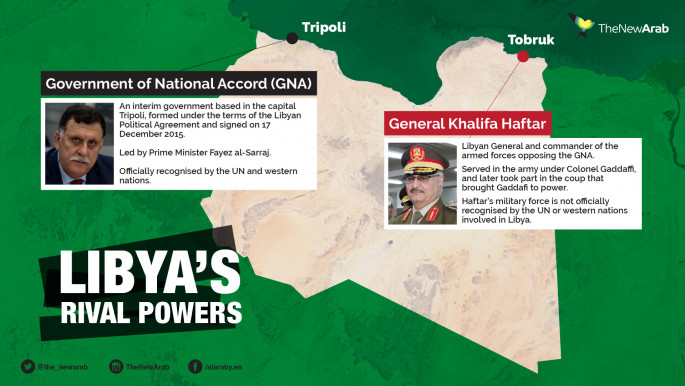Turkey asks Russia to get Haftar to accept Libya ceasefire
Turkey on Saturday asked Russia to convince eastern Libyan strongman Khalifa Haftar to respect a ceasefire initiative by Ankara and Moscow that he has rejected.
"We are waiting for our Russian friends to succeed in convincing Haftar," Foreign Minister Mevlut Cavusoglu told a news conference.
In a statement read by his spokesman Ahmad al-Mesmari, Haftar claimed that a revival of the political process and the country's stability could only be assured by the "eradication of terrorist groups" and the dissolution of militia controlling Tripoli.
An adviser to Haftar later told AFP that Haftar's position did not amount to a rejection of the ceasefire initiative, but rather "conditions that must be fulfilled" ahead of any truce.
Haftar's forces in April launched an offensive against the capital, seat of the UN-recognised Government of National Accord (GNA).
Turkish President Recep Tayyip Erdogan and his Russian counterpart Vladimir Putin called for a ceasefire on Wednesday in Istanbul.
Cavusoglu accused "regional nations" - a reference to Arab countries backing Haftar and also to France - of opposing a ceasefire.
"France is looking for any means to sabotage any initiative of which is not party to," he said.
Turkey last week started deploying troops in Libya to back the GNA led by Fayez al-Sarraj.
Cavusoglu also said Saturday that a new ceasefire brokered by Ankara and Moscow was due to come into force at 0001 GMT Sunday in Idlib, the last rebel bastion in Syria's northwest.
"We hope that it will be lasting this time and that Russia will be able to control the regime forces," he said.
Russia is a key backer of the Syrian regime of President Bashar al-Assad.
The Syrian conflict began in March 2011 and has claimed more than 500,000 lives and displaced millions.





 Follow the Middle East's top stories in English at The New Arab on Google News
Follow the Middle East's top stories in English at The New Arab on Google News
![The UAE is widely suspected of arming the RSF militia [Getty]](/sites/default/files/styles/image_330x185/public/2024-11/GettyImages-472529908.jpg?h=69f2b9d0&itok=Yauw3YTG)
![Netanyahu furiously denounced the ICC [Getty]](/sites/default/files/styles/image_330x185/public/2024-11/GettyImages-2169352575.jpg?h=199d8c1f&itok=-vRiruf5)
![Both Hamas and the Palestinian Authority welcomed the ICC arrest warrants [Getty]](/sites/default/files/styles/image_330x185/public/2024-11/GettyImages-2178351173.jpg?h=199d8c1f&itok=TV858iVg)